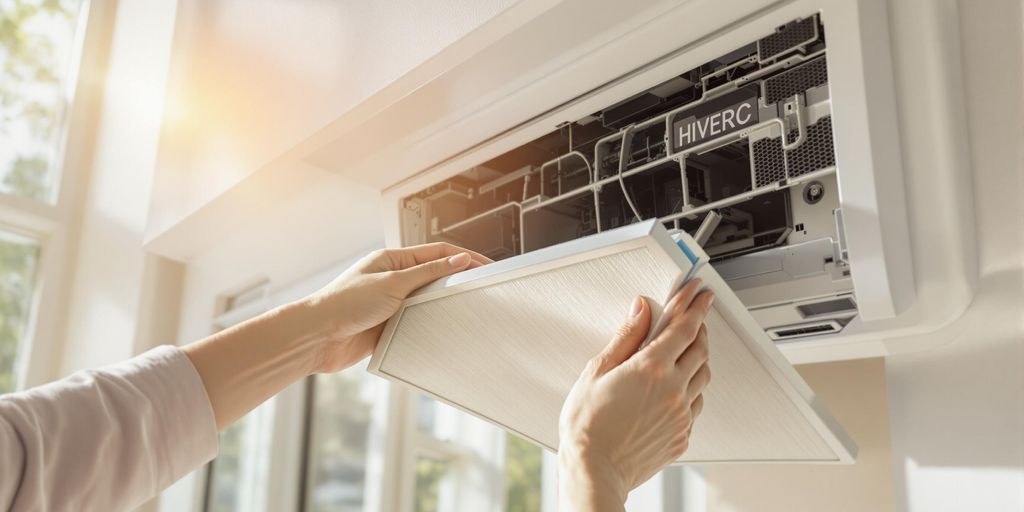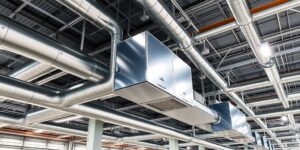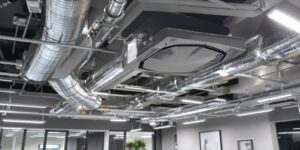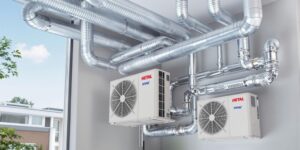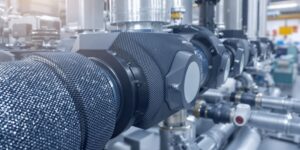Ever wonder why your home’s air feels stuffy or why your allergies flare up indoors? It might be time to look at your HVAC system’s filters. These filters play a big role in keeping the air in your home clean and breathable. From catching dust and pollen to making sure your HVAC system runs smoothly, the right filter can make a world of difference. Let’s dive into the essentials of HVAC filter services and see how they can boost your home’s air quality.
Key Takeaways
- HVAC filters are crucial for maintaining indoor air quality by trapping dust, pollen, and other particles.
- Regular maintenance and timely replacement of filters can enhance HVAC efficiency and prolong its lifespan.
- Different types of filters, like HEPA, activated carbon, and electrostatic, offer varying levels of filtration.
- Advanced technologies such as UV purifiers and smart filters are available for better air purification.
- Consulting HVAC professionals can provide insights into the best filter choices and maintenance practices.
Understanding The Importance Of HVAC Filter Services
Impact On Indoor Air Quality
Ever thought about how clean the air in your home really is? HVAC filters are your home’s first line of defense against all kinds of airborne nasties. These filters trap dust, pollen, and even bacteria, keeping them from circulating through your vents. Without them, indoor air pollution can actually be worse than outside! It’s wild, but true. That’s why you need a good filter that can catch even the tiniest particles. Portable air cleaners and HVAC filters can help reduce indoor air pollution, but they’re not miracle workers that eliminate everything.
Role In System Efficiency
Let’s talk efficiency. Your HVAC system works hard to keep your home comfy, but it needs a little help. A clean filter means your system doesn’t have to work overtime to push air through. When filters get clogged, your system struggles, uses more energy, and can even break down. It’s like trying to breathe through a straw! So, regular filter changes not only save you money on energy bills but also extend the life of your unit.
Health Benefits Of Clean Air
Breathing clean air isn’t just nice; it’s necessary. Dirty air can aggravate allergies, asthma, and even lead to respiratory issues over time. Clean filters mean cleaner air, which is crucial for everyone, but especially for kids and seniors. Imagine a home where you can breathe easy, knowing your air is free from harmful particles. It’s a simple step with big health benefits.
Types Of HVAC Filters For Optimal Performance
High-Efficiency Particulate Air Filters
High-Efficiency Particulate Air (HEPA) filters are the gold standard when it comes to air filtration. These filters are designed to capture at least 99.97% of particles that are 0.3 microns or larger. This includes dust, pollen, mold spores, and even some bacteria and viruses. If you have allergies or respiratory issues, a HEPA filter can be a game-changer. They’re particularly effective in homes with pets or where air quality is a major concern. However, it’s crucial to check if your HVAC system is compatible with HEPA filters, as they can restrict airflow if the system isn’t designed to handle them.
Activated Carbon Filters
Activated carbon filters are unique because they can remove odors and gaseous pollutants from the air. These filters use a bed of activated carbon to absorb volatile organic compounds (VOCs), smoke, and other odors. They’re not as effective at removing dust and allergens as HEPA filters, but they excel at improving air freshness. If you’re dealing with persistent smells from cooking, smoking, or pets, incorporating an activated carbon filter into your HVAC system can make a noticeable difference.
Electrostatic Filters
Electrostatic filters use an electric charge to attract and trap particles. As air passes through the filter, the static charge causes particles to stick to the filter media. These filters can be washable and reusable, making them an eco-friendly choice. While they aren’t as effective as HEPA filters in capturing ultra-fine particles, they do a good job with larger particles like dust and pollen. Electrostatic filters can be a cost-effective option for those looking to reduce waste and maintain decent air quality without frequent replacements.
Choosing the right HVAC filter is all about balancing your air quality needs with your system’s capabilities. Each type has its strengths, so consider what matters most for your home and lifestyle. For a more detailed exploration of filter options, check out this expert guide on maximizing air flow and efficiency.
Regular Maintenance For HVAC Filters
Frequency Of Filter Replacement
Keeping your HVAC filter in check is a straightforward yet crucial part of maintaining your home’s air quality. Regular replacement of air filters is vital for keeping your system running smoothly. Generally, filters should be swapped out every one to three months, but this can vary based on the type of filter and your household’s specific needs. For instance, basic filters might need more frequent changes, especially if you have pets or allergies in the house. On the other hand, high-efficiency filters like HEPA can last up to 12 months, but it’s always a good idea to check them regularly.
Signs Of Clogged Filters
Recognizing when your filter is clogged is just as important as knowing when to replace it. Here are some telltale signs:
- Increased Dust Levels: If you notice more dust settling on surfaces, it might be due to a clogged filter.
- Reduced Airflow: A significant drop in airflow from your vents can indicate a blockage.
- Higher Energy Bills: A sudden spike in your energy costs could mean your HVAC system is working overtime due to a dirty filter.
Professional Maintenance Services
While DIY maintenance is handy, sometimes you need to call in the pros. Professional HVAC maintenance services offer several benefits:
- Thorough Inspections: Experts can spot issues you might miss, ensuring your system runs efficiently.
- Advanced Cleaning: Professionals have the tools and skills to clean parts of your HVAC system that are hard to reach.
- System Longevity: Regular professional check-ups can extend the life of your HVAC system, saving you money in the long run.
Regular maintenance not only improves air quality but also enhances the overall efficiency of your HVAC system. Don’t wait for a breakdown to take action—routine checks can prevent costly repairs and ensure you breathe easy all year round.
Advanced Air Filtration Technologies
UV Air Purification Systems
UV air purification systems are like the secret weapon in your HVAC arsenal. These systems use ultraviolet light to zap bacteria, viruses, and mold spores right out of the air. Imagine a tiny light saber in your ductwork, quietly doing its job to keep your air clean. They’re particularly handy for folks with allergies or anyone looking to boost their home’s air quality. Plus, they can help your HVAC system run smoother by reducing the gunk that clogs up filters and ducts.
Smart Filter Innovations
Smart filters are the tech-savvy upgrade your HVAC system didn’t know it needed. These filters come with built-in sensors that keep an eye on air quality and filter status. They’ll even send you a notification when it’s time for a swap. No more guessing or forgetting! It’s like having a little HVAC assistant in your pocket. And as part of advanced air purification systems, they work alongside multi-stage filtration to capture a wide range of pollutants, ensuring your indoor air stays fresh and healthy.
Ionization Technologies
Ionization technologies are all about charging up particles in the air so they stick to surfaces or get trapped in filters more easily. It’s like a magnet for dust and allergens. These systems can be particularly effective in reducing airborne contaminants, making your home a more pleasant place to breathe. They’re a great option if you’re looking to add an extra layer of protection to your home’s air quality strategy.
Common Myths About HVAC Filter Services
Misconceptions About Filter Replacement
When it comes to HVAC filters, a lot of folks think they only need to be swapped out once a year. This couldn’t be further from the truth. Depending on your home’s environment, you might need to replace them more frequently. For instance, if you have pets or if someone in your home suffers from allergies, changing the filter every couple of months might be necessary. The idea is to keep your air clean and your system running smoothly.
Understanding MERV Ratings
Another myth is that the higher the MERV rating, the better the filter. While a higher MERV rating does mean the filter can trap smaller particles, it also means your HVAC system has to work harder to push air through. A MERV rating between 8 and 12 is generally sufficient for most homes. Going too high can actually put a strain on your system, leading to inefficiency and potential damage.
The Truth About Washable Filters
Washable filters sound like a great idea because they seem economical, but they often have low MERV ratings. This means they might not capture as many particles as disposable filters. Plus, if not cleaned properly, they can harbor mold and bacteria, which defeats the purpose of having a filter in the first place. It’s essential to weigh the pros and cons before deciding on a washable filter.
Regular maintenance and understanding your HVAC system’s needs are key to optimal performance. Don’t fall for myths that could compromise your home’s air quality and system efficiency.
Enhancing Air Quality With Additional Services

Duct Cleaning Importance
Keeping your home’s air ducts clean is like giving your house a breath of fresh air. Over time, dust, mold, and other nasty stuff can build up in your ducts, making your air less than fresh. Regular duct cleaning can help keep these pollutants at bay, improving the air you breathe every day. Think about scheduling a professional cleaning every few years to make sure your system is running smoothly and your air is as clean as it can be.
Ventilation System Upgrades
Good ventilation is key to a healthy home. Without it, you’re just recycling the same old air, along with all the pollutants it carries. Upgrading your ventilation system can make a world of difference. Consider systems like Energy Recovery Ventilators (ERVs) or Heat Recovery Ventilators (HRVs), which bring in fresh air while conserving energy. Not only do these systems improve air quality, but they also help keep your home energy-efficient.
Air Quality Testing Services
Ever wonder what’s really in the air you’re breathing? Air quality testing can give you the answers. This service identifies pollutants and allergens floating around your home, helping you target specific issues. It’s a smart move, especially if you have allergies or respiratory problems. Once you know what’s in your air, you can take steps to clean it up and breathe easier every day.
Investing in additional services like duct cleaning, ventilation upgrades, and air quality testing can significantly improve your home’s air quality. It’s about making your home a healthier place for you and your family.
Consulting Professionals For HVAC Filter Services

When To Seek Expert Help
Sometimes, it might be tempting to handle HVAC issues on your own, but there are moments when calling a professional is the best route. If your family experiences unexplained respiratory problems or if your house feels unusually humid or dry, it might be time to have an HVAC pro take a look. They can spot issues that aren’t obvious and suggest the right fixes. Plus, if your system struggles to maintain airflow or temperature, a professional can help identify and solve the problem.
Benefits Of Professional Inspections
Having a professional inspect your HVAC system regularly can save you a lot of headaches. They can catch small issues before they turn into big problems, potentially saving you money in the long run. Here are some benefits:
- Early detection of potential problems
- Improved system efficiency
- Extended lifespan of your HVAC equipment
Professionals can also recommend the best clean air solutions tailored to your home’s needs, ensuring optimal air quality.
Choosing The Right HVAC Technician
Selecting the right technician is crucial for maintaining your HVAC system. Look for someone with experience, good reviews, and proper certifications. Here’s a quick checklist:
- Verify their certifications and licenses.
- Check customer reviews and ratings.
- Ask about their experience with your specific HVAC model.
A great technician not only fixes problems but also provides peace of mind, knowing your system is in capable hands.
Choosing the right professional can make all the difference in keeping your home’s air clean and your HVAC system running smoothly.
Conclusion
Wrapping it all up, keeping your home’s air clean is more than just swapping out a filter now and then. It’s about understanding what your HVAC system needs and making sure it’s running smoothly. Whether it’s adding a high-efficiency filter, scheduling regular maintenance, or even installing an air purifier, every little step counts. Remember, clean air isn’t just a luxury—it’s a necessity for a healthy home. So, take a moment to check your system, maybe call in a pro if you’re unsure, and breathe easy knowing you’re doing your part to keep your indoor air fresh and clean.
Frequently Asked Questions
How often should I change my HVAC filter?
It’s best to change your HVAC filter every 1 to 3 months. If you have pets or allergies, consider changing it more often.
Can air purifiers really clean all the air in my home?
Air purifiers can help remove many pollutants, but they can’t catch everything. Using them with good filters and regular maintenance works best.
What signs show my HVAC filter is clogged?
If your home is dustier than usual, or if your HVAC system isn’t working well, your filter might be clogged.
Are washable filters a good option?
Washable filters can be reused, but they might not clean the air as well as other filters. Check their ratings before choosing.
What does MERV rating mean?
MERV rating shows how well a filter can trap particles. Higher numbers mean better filtration, but make sure they’re right for your system.
When should I call a professional for HVAC help?
Call a pro if your system isn’t cooling or heating well, or if you notice strange noises or smells. Regular check-ups can prevent problems.
